FAMU Sculptures
Item set
- Title
- FAMU Sculptures
Items
-
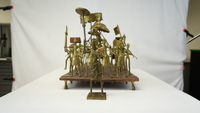 "The Kings Procession" Brass Sculpture The King's Procession sculpture captures a scene of royal magnificence as a regal figure, adorned in ceremonial attire, is accompanied by an entourage of attendants, soldiers, and dignitaries. Donated by FAMU alumnus and FAMU hall of famer Frank Pinder.
"The Kings Procession" Brass Sculpture The King's Procession sculpture captures a scene of royal magnificence as a regal figure, adorned in ceremonial attire, is accompanied by an entourage of attendants, soldiers, and dignitaries. Donated by FAMU alumnus and FAMU hall of famer Frank Pinder. -
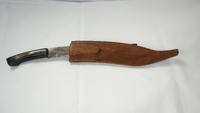 Hand Carved Bolo Knife The hand carved bolo knife donated by the family of Benjamin French, was used for harvesting crops, hunting and clearing dense brush.
Hand Carved Bolo Knife The hand carved bolo knife donated by the family of Benjamin French, was used for harvesting crops, hunting and clearing dense brush. -
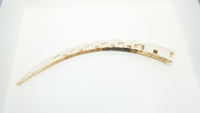 Ivory Tusk Carving The Ivory Tusk Sculpture is a masterful work of craftsmanship, painstakingly sculpted to capture the essence of the food chain—a fundamental aspect of ecological dynamics and donated by Dr. Don Hill, a former FAMU professor of mathematics.
Ivory Tusk Carving The Ivory Tusk Sculpture is a masterful work of craftsmanship, painstakingly sculpted to capture the essence of the food chain—a fundamental aspect of ecological dynamics and donated by Dr. Don Hill, a former FAMU professor of mathematics. -
 Dark Wood Chair The dark wood chair from Tanzania, hewn from the sturdy trunk of an oak tree, stands as a testament to the ingenuity and craftsmanship of those who toiled under the yoke of slavery, donated by Tallahassee locals Calynne and Louis Hill.
Dark Wood Chair The dark wood chair from Tanzania, hewn from the sturdy trunk of an oak tree, stands as a testament to the ingenuity and craftsmanship of those who toiled under the yoke of slavery, donated by Tallahassee locals Calynne and Louis Hill. -
 The Law A bronze bust of Dr. William P. Foster is a sculpture depicting the head and shoulders of Dr. Foster, a prominent figure in the world of marching bands and music education.
The Law A bronze bust of Dr. William P. Foster is a sculpture depicting the head and shoulders of Dr. Foster, a prominent figure in the world of marching bands and music education. -
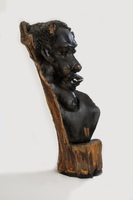 Warning to Women Warning to Women who threaten the family, flocks or garden stories often serve as moral lessons about the importance of respect, harmony, and balance in the community and the natural world. Dr. Robbya Green- Weir an assistant professor in Health Administration at FAMU suggested that MEBA was an ideal landing place for the Field Spirits of the Fante Collection. The importance of the collection to FAMU would be that it represents the agricultural significance of FAMU.
Warning to Women Warning to Women who threaten the family, flocks or garden stories often serve as moral lessons about the importance of respect, harmony, and balance in the community and the natural world. Dr. Robbya Green- Weir an assistant professor in Health Administration at FAMU suggested that MEBA was an ideal landing place for the Field Spirits of the Fante Collection. The importance of the collection to FAMU would be that it represents the agricultural significance of FAMU. -
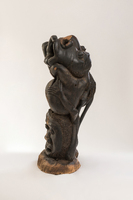 Warning to Men Warning to Men who threaten the family, flocks or garden warnings serve to emphasize the importance of respect for nature, family, and community, highlighting the interconnectedness of all living beings and the consequences of actions that disrupt this balance.Dr. Robbya Green- Weir an assistant professor in Health Administration at FAMU suggested that MEBA was an ideal landing place for the Field Spirits of the Fante Collection. The importance of the collection to FAMU would be that it represents the agricultural significance of FAMU.
Warning to Men Warning to Men who threaten the family, flocks or garden warnings serve to emphasize the importance of respect for nature, family, and community, highlighting the interconnectedness of all living beings and the consequences of actions that disrupt this balance.Dr. Robbya Green- Weir an assistant professor in Health Administration at FAMU suggested that MEBA was an ideal landing place for the Field Spirits of the Fante Collection. The importance of the collection to FAMU would be that it represents the agricultural significance of FAMU. -
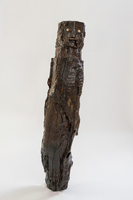 Totem The Totem can represent a family, clan, or tribe and are often depicted as animals, plants, or other natural objects and its presence is seen as a source of strength and unity for the community. Dr. Robbya Green- Weir an assistant professor in Health Administration at FAMU suggested that MEBA was an ideal landing place for the Field Spirits of the Fante Collection. The importance of the collection to FAMU would be that it represents the agricultural significance of FAMU.
Totem The Totem can represent a family, clan, or tribe and are often depicted as animals, plants, or other natural objects and its presence is seen as a source of strength and unity for the community. Dr. Robbya Green- Weir an assistant professor in Health Administration at FAMU suggested that MEBA was an ideal landing place for the Field Spirits of the Fante Collection. The importance of the collection to FAMU would be that it represents the agricultural significance of FAMU. -
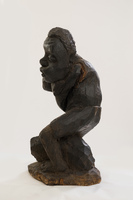 The Boxer Sentry to the Home "The Boxer" a guardian spirit, deity, or symbol tasked with protecting the household from harm. This concept often reflects the universal human desire for security and protection within the domestic sphere.Dr. Robbya Green- Weir an assistant professor in Health Administration at FAMU suggested that MEBA was an ideal landing place for the Field Spirits of the Fante Collection.The importance of the collection to FAMU would be that it represents the agricultural significance of FAMU.
The Boxer Sentry to the Home "The Boxer" a guardian spirit, deity, or symbol tasked with protecting the household from harm. This concept often reflects the universal human desire for security and protection within the domestic sphere.Dr. Robbya Green- Weir an assistant professor in Health Administration at FAMU suggested that MEBA was an ideal landing place for the Field Spirits of the Fante Collection.The importance of the collection to FAMU would be that it represents the agricultural significance of FAMU. -
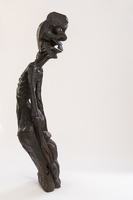 Sentry of the Fields Sentry of the Fields is a symbolic figure representing the protective presence over agricultural lands and embodies the deep connection between humanity and the land, highlighting the importance of stewardship and respect for the natural world in agricultural societies. Dr. Robbya Green- Weir an assistant professor in Health Administration at FAMU suggested that MEBA was an ideal landing place for the Field Spirits of the Fante Collection.The importance of the collection to FAMU would be that it represents the agricultural significance of FAMU.
Sentry of the Fields Sentry of the Fields is a symbolic figure representing the protective presence over agricultural lands and embodies the deep connection between humanity and the land, highlighting the importance of stewardship and respect for the natural world in agricultural societies. Dr. Robbya Green- Weir an assistant professor in Health Administration at FAMU suggested that MEBA was an ideal landing place for the Field Spirits of the Fante Collection.The importance of the collection to FAMU would be that it represents the agricultural significance of FAMU. -
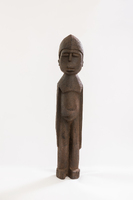 Bateba- protector of women and children The Bateba associated with the protection of women and children are revered for their nurturing and protective qualities. They are often placed in homes or shrines to provide spiritual protection and support to women and children in the community. Dr. Robbya Green- Weir an assistant professor in Health Administration at FAMU suggested that MEBA was an ideal landing place for the Field Spirits of the Fante Collection.The importance of the collection to FAMU would be that it represents the agricultural significance of FAMU.
Bateba- protector of women and children The Bateba associated with the protection of women and children are revered for their nurturing and protective qualities. They are often placed in homes or shrines to provide spiritual protection and support to women and children in the community. Dr. Robbya Green- Weir an assistant professor in Health Administration at FAMU suggested that MEBA was an ideal landing place for the Field Spirits of the Fante Collection.The importance of the collection to FAMU would be that it represents the agricultural significance of FAMU. -
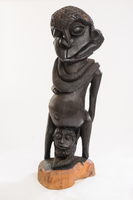 Protector of the flocks of sheep Protector of flocks of the sheep watches over and ensures the well-being of the animals, protecting them from predators, diseases, and other dangers.Dr. Robbya Green- Weir an assistant professor in Health Administration at FAMU suggested that MEBA was an ideal landing place for the Field Spirits of the Fante Collection.The importance of the collection to FAMU would be that it represents the agricultural significance of FAMU.
Protector of the flocks of sheep Protector of flocks of the sheep watches over and ensures the well-being of the animals, protecting them from predators, diseases, and other dangers.Dr. Robbya Green- Weir an assistant professor in Health Administration at FAMU suggested that MEBA was an ideal landing place for the Field Spirits of the Fante Collection.The importance of the collection to FAMU would be that it represents the agricultural significance of FAMU. -
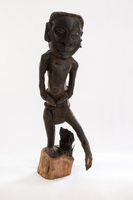 Protector of the providers Protector of the providers refers to any deity, spirit, or symbol that represents protection, guidance, or support for those who work to provide for others, such as farmers, laborers, or caregivers. Dr. Robbya Green- Weir an assistant professor in Health Administration at FAMU suggested that MEBA was an ideal landing place for the Field Spirits of the Fante Collection. The importance of the collection to FAMU would be that it represents the agricultural significance of FAMU.
Protector of the providers Protector of the providers refers to any deity, spirit, or symbol that represents protection, guidance, or support for those who work to provide for others, such as farmers, laborers, or caregivers. Dr. Robbya Green- Weir an assistant professor in Health Administration at FAMU suggested that MEBA was an ideal landing place for the Field Spirits of the Fante Collection. The importance of the collection to FAMU would be that it represents the agricultural significance of FAMU. -
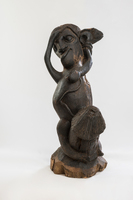 Protector of the home Protector of the home is the spirit or deity responsible for safeguarding the household and its inhabitants. Often depicted as a benevolent force, offering protection from physical and spiritual harm. Dr. Robbya Green- Weir an assistant professor in Health Administration at FAMU suggested that MEBA was an ideal landing place for the Field Spirits of the Fante Collection. The importance of the collection to FAMU would be that it represents the agricultural significance of FAMU.
Protector of the home Protector of the home is the spirit or deity responsible for safeguarding the household and its inhabitants. Often depicted as a benevolent force, offering protection from physical and spiritual harm. Dr. Robbya Green- Weir an assistant professor in Health Administration at FAMU suggested that MEBA was an ideal landing place for the Field Spirits of the Fante Collection. The importance of the collection to FAMU would be that it represents the agricultural significance of FAMU. -
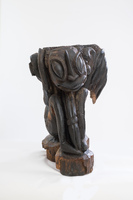 Protector of the crops Protector of crops embodies the spirit or deity responsible for ensuring the fertility and well-being of agricultural lands. Responsible for overseeing the growth of crops and protecting them from harm. Dr. Robbya Green- Weir an assistant professor in Health Administration at FAMU suggested that MEBA was an ideal landing place for the Field Spirits of the Fante Collection. The importance of the collection to FAMU would be that it represents the agricultural significance of FAMU.
Protector of the crops Protector of crops embodies the spirit or deity responsible for ensuring the fertility and well-being of agricultural lands. Responsible for overseeing the growth of crops and protecting them from harm. Dr. Robbya Green- Weir an assistant professor in Health Administration at FAMU suggested that MEBA was an ideal landing place for the Field Spirits of the Fante Collection. The importance of the collection to FAMU would be that it represents the agricultural significance of FAMU.